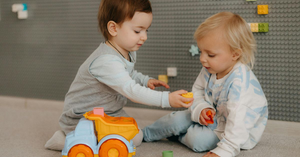We all want the best for our children. We drive them to countless activities, help with homework, and ensure they have nutritious meals. Yet sometimes, in the chaos of everyday life, certain habits slip by unnoticed—habits that could be silently undermining our children's wellbeing. Today, let's take a look at these parenting blind spots and explore how we can address them, even when our kids resist change.
Sitting for Hours Without Moving
The sedentary lifestyle has become increasingly common among children, with many spending hours sitting in front of screens, doing homework, or playing video games without taking movement breaks. While it might seem harmless or even productive—after all, they're engaged and quiet—this lack of physical activity is taking a serious toll on their developing bodies and minds. Extended sitting is linked to poor posture, weakened core muscles, decreased bone density, and even impaired cognitive function.
Children often resist changing this habit because digital activities are designed to be engaging and provide immediate social connection or entertainment rewards.
To address this, try implementing the "30/30 rule"—30 minutes of seated activity followed by 30 seconds of movement. Make it fun by creating family movement challenges or finding active versions of their favorite games. Remember to acknowledge their perspective: "I know your online friends are important to you, but your body needs movement to grow strong."
Chronic Stress Every Day
In our achievement-oriented society, children are experiencing unprecedented levels of chronic stress from academics, extracurriculars, social pressures, and family expectations. What many parents miss is that young bodies and brains aren't designed to handle continuous stress hormones, which can literally reshape developing neural pathways and affect everything from immune function to emotional regulation.
Kids often don't recognize stress symptoms in themselves and may resist stress-reduction efforts because they fear falling behind peers or disappointing adults.
When approaching this sensitive topic, start by validating their concerns: "I understand you're worried about keeping up with everything. That's a real concern." Then introduce simple stress management techniques as "performance enhancers" rather than remedies—deep breathing before tests, mindfulness during transitions, or brief meditation before bed. Gradually work toward a more balanced schedule where achievement and well-being are equally valued.
Letting Clutter Pile Up
The chaotic environments that many children live in—with toys, clothes, papers, and devices scattered everywhere—seem like a mere aesthetic issue to many parents. However, research consistently shows that physical clutter creates mental clutter. Living in disorganized spaces reduces focus, increases stress hormones, and makes it difficult for developing brains to filter important information from background noise.
Children often fiercely resist cleaning efforts because the task seems overwhelming, they don't see the immediate benefit, or they've adapted to functioning in chaos.
Rather than demanding complete organization, start with creating one "clear space" in their room that must remain clutter-free. Explain how our external environment affects our internal states: "Having a clean desk helps your brain focus on one thing at a time." Make organization a skill you teach rather than a chore you assign, showing them systems that match their thinking style.
Overloading on Work or Studies
Academic pressure has reached concerning levels, with many children's schedules packed with classes, tutoring, homework, and test prep. While parents naturally want their children to succeed academically, this overloading often backfires by creating diminishing returns—tired brains retain less, creativity suffers, and motivation eventually plummets.
Children resist reducing their workload because they've internalized messages about competitive college admissions, future success being tied to academic performance, and the virtue of "working harder."
When addressing this habit, focus on the quality of learning rather than quantity: "Understanding one concept deeply is more valuable than memorizing three poorly." Introduce the science of effective learning, showing how breaks, sleep, and variety actually improve academic outcomes. Create designated "no-work zones" in your home and schedule where academics are off-limits, allowing the brain necessary recovery time.
Avoiding Challenges or Learning
Many children have developed a habit of avoiding anything difficult, preferring activities where success is guaranteed or the learning curve is minimal. This avoidance of challenge—whether in academics, physical skills, social situations, or creative endeavors—prevents the development of resilience and a growth mindset that are crucial for long-term success.
Children resist challenging themselves because failure feels threatening to their identity, or they've developed what psychologists call "learned helplessness" after previous struggles.
When introducing more challenging activities, start with their areas of interest and frame difficulties as part of the excitement: "The reason video game designers make levels harder as you go is because overcoming challenges feels rewarding to your brain." Share stories of your own learning struggles, normalize the discomfort of not being immediately good at something, and celebrate effort regardless of outcome.
Bottling Up Emotions
In many families, children learn early that certain emotions—particularly anger, fear, or sadness—are unwelcome or should be quickly "fixed." This leads to emotional suppression, where children push down feelings rather than processing them healthily. This habit is particularly dangerous because unexpressed emotions don't disappear; they transform into physical symptoms, behavioral problems, or emotional outbursts in "safe" environments.
Children resist emotional expression because they fear judgment, don't have vocabulary for complex feelings, or have received subtle messages that emotions are signs of weakness.
To help your child develop emotional intelligence, create regular, non-judgmental spaces for feeling discussions, perhaps at bedtime or during car rides. Use simple language: "When emotions stay inside, they tend to grow bigger. When we name them and share them, they often get smaller." Model appropriate emotional expression yourself, letting them see how you handle disappointment, frustration, or sadness in healthy ways.
Eating Too Close to Bedtime
The habit of late-night snacking or heavy evening meals has become common in many busy households, where dinner may happen just before bedtime or snacks continue right up until sleep time. What many parents don't realize is that digestion requires significant energy from the body—energy that should be directed toward important restorative processes during sleep. Eating close to bedtime disrupts sleep quality, can contribute to acid reflux, and may even affect metabolism and weight regulation.
Children resist changing this habit because eating often provides comfort, social connection, or simply feels like an enjoyable way to extend the day.
To address this habit, establish a kitchen "closing time" at least two hours before bed, and create alternative evening rituals like reading, gentle stretching, or family conversation. Explain the connection between good sleep and everything from sports performance to academic success: "Your body has important work to do while you sleep, and it can't do that work well when it's busy digesting food."
Staying Indoors All Day
Modern children spend unprecedented amounts of time indoors, often going days without meaningful outdoor exposure. This indoor lifestyle deprives them of natural light (essential for vitamin D production and circadian rhythm regulation), varied sensory experiences that build brain connections, and the unique type of attention restoration that nature provides.
Children frequently resist outdoor time because indoor environments offer more immediate stimulation, temperature control, and access to technology.
When encouraging outdoor time, start with short, engaging activities connected to their interests—a nature scavenger hunt for younger children or a photography walk for teens. Gradually increase duration as they build positive associations. Emphasize the freedom aspects of outdoor time: "Outside is where you can be louder, move your whole body, and make your own rules." Point out improvements in their mood, sleep, or focus that follow outdoor time, helping them connect cause and effect.
Neglecting Hobbies or Passions
With academic and extracurricular pressures mounting, many children abandon activities they genuinely enjoy because these pursuits don't seem "productive" or resume-worthy. This neglect of authentic interests—whether artistic, mechanical, athletic, or intellectual—removes important sources of flow, identity development, and intrinsic motivation from children's lives. The absence of passion-driven activities increases vulnerability to anxiety and depression while reducing the opportunities to experience competence and mastery.
Children often let go of these activities because they've internalized adult messages about what "counts" as valuable use of time.
To counteract this trend, create protected time for non-instrumental activities—things done purely for enjoyment rather than achievement. Ask them about activities that make them lose track of time, and prioritize these in the family schedule. Share the research on how passion pursuits often become career paths or provide crucial balance to high-achievers: "The skills you're building when you do things you love—persistence, creativity, focus—transfer to everything else in life."
Gossiping Frequently
The habit of talking negatively about others behind their backs has become normalized in many peer groups and even families. While it might seem like harmless social bonding, habitual gossip trains children to focus on others' flaws, damages trust in relationships, and creates anxiety about what might be said about them when they're not present. Children who frequently gossip are developing a critical mindset rather than a compassionate one, which affects how they view themselves as well as others.
Children resist giving up gossip because it provides immediate social currency and a false sense of belonging.
When addressing this habit, avoid shame-based approaches and instead focus on building alternative social skills: "Strong relationships are built on loyalty and kindness." Role-play how to redirect conversations when others start gossiping, and notice when your child speaks positively about peers, reinforcing this behavior: "I love how you mentioned what Aiden did well in his presentation—that shows real friendship."
Forgetting to Laugh Often
In the rush of schedules, achievements, and responsibilities, many families have lost the habit of regular, authentic laughter. Playfulness and humor are often sacrificed to efficiency and seriousness, creating homes where joy feels scheduled rather than spontaneous. The absence of regular laughter affects not just mood but also impacts immune function, stress hormone levels, and social bonding.
Children may resist "mandated fun" because it feels forced or because they've adapted to a more serious approach to life.
Rather than scheduling specific "fun time," look for opportunities to bring playfulness into everyday moments—an impromptu dance party while cleaning up, a silly voice during homework questions, or family inside jokes that evolve over time. Share funny stories from your own day, play games that naturally generate laughter, and be willing to laugh at yourself when things go wrong. The simple acknowledgment "We haven't been laughing enough lately" can open the door to more lighthearted interactions.
Holding onto Grudges Too Long
Many children have developed the habit of nursing grievances, reliving social slights, or maintaining ongoing feuds with siblings or peers. While parents often dismiss this as normal childhood drama, the habit of grudge-holding establishes neural pathways that can lead to lasting patterns of rumination and resentment. Children who can't move past hurts spend mental and emotional energy on past injuries rather than present opportunities, and they miss the chance to develop crucial forgiveness skills.
Children resist letting go of grudges because the anger feels protective or because they lack models for healthy conflict resolution.
To address this habit, acknowledge the legitimacy of their hurt feelings first: "I understand why that made you angry, and those feelings make sense." Then help them distinguish between having feelings and being defined by them: "You can feel angry without letting anger make your decisions." Teach the practical skill of setting boundaries without holding grudges: "You can choose not to play with someone who hurt your feelings AND still wish them well."
Conclusion
Remember that change is difficult for everyone, especially children who lack our adult perspective on long-term consequences. When addressing these habits, ask questions first to understand their attachment before suggesting alternatives. Share the science behind your concerns in age-appropriate ways, make changes gradually rather than dramatically, and acknowledge that giving up comfortable habits genuinely feels like a loss. Most importantly, model the healthy behaviors you hope to see—children follow what we do far more than what we say.








Be the first one to comment on this story.